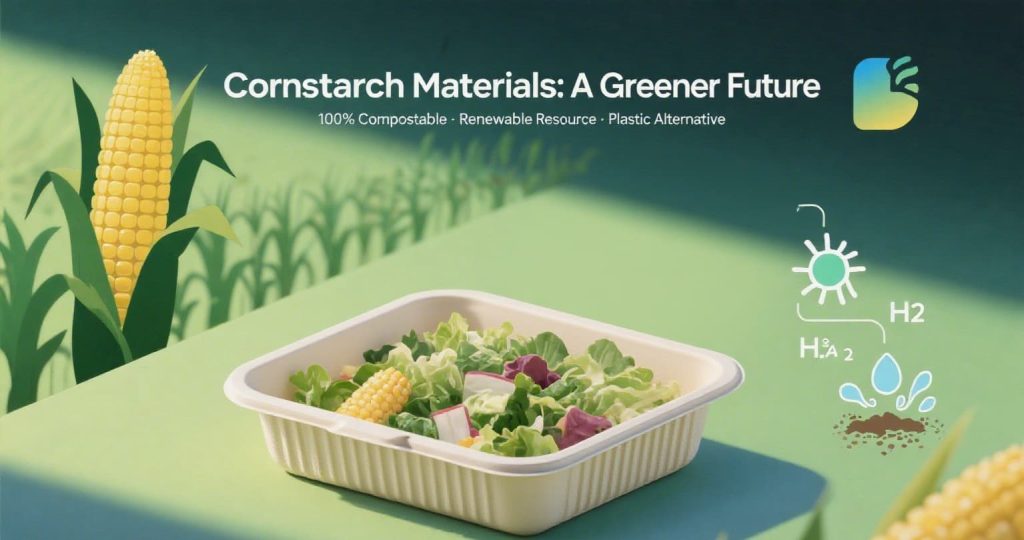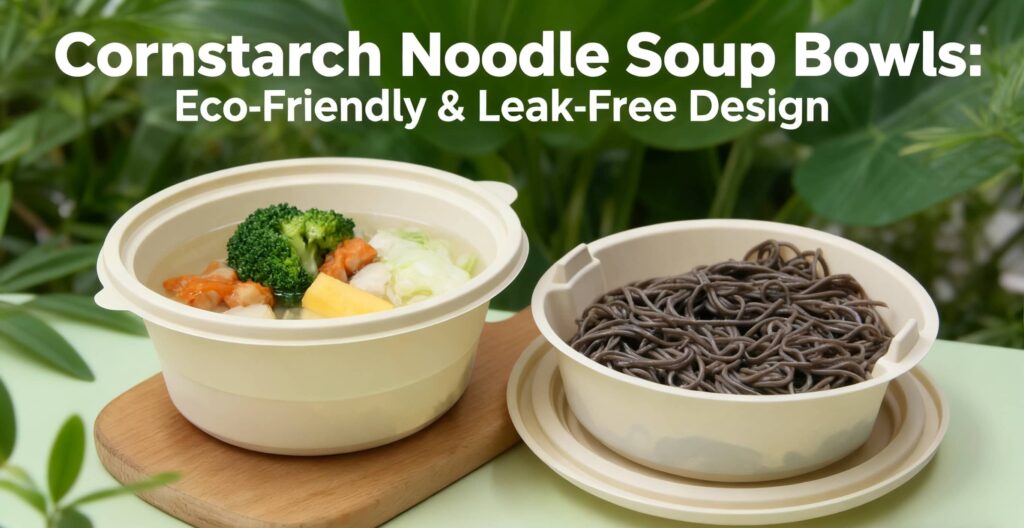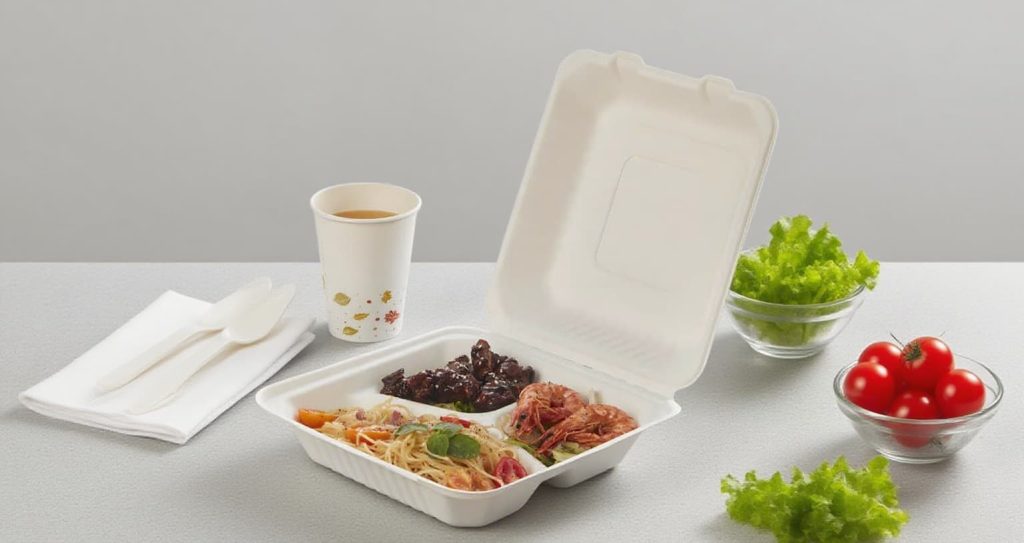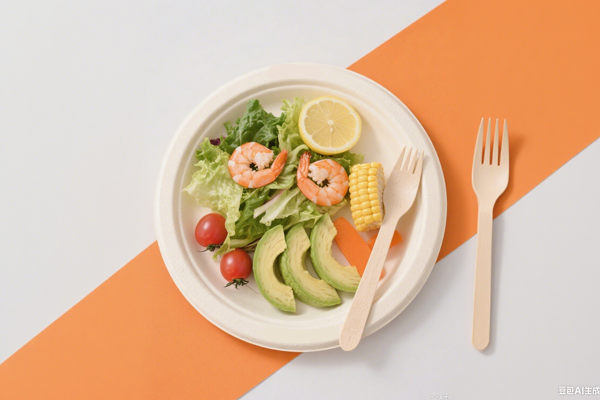
Introduction
Hong Kong has taken a bold step by implementing a comprehensive plastic ban, restricting the use of single-use plastic products in both retail and foodservice industries. While this move addresses pressing environmental concerns, it also forces businesses and consumers to adapt quickly. Among the sustainable alternatives gaining traction, corn starch tableware has emerged as one of the most practical and eco-friendly solutions.
This article explores why corn starch tableware is the ideal alternative under Hong Kong’s plastic ban, examining its properties, applications, market opportunities, and future outlook. We draw on industry expertise, global case studies, and expert opinions to demonstrate how businesses can make a seamless transition to greener dining solutions.
1. The Context: Hong Kong’s Plastic Ban

-
Since April 2024, the first phase of Hong Kong’s plastic ban prohibits the sale and use of expanded polystyrene (EPS) tableware, plastic straws, stirrers, and cutlery.
-
By 2025, the second phase will expand restrictions to plastic cups, lids, and takeaway containers.
-
Non-compliance can lead to fines up to HK$100,000, creating strong pressure for restaurants, hotels, and retailers to seek alternatives.
“The plastic ban is not only an environmental milestone but also a catalyst for innovation in packaging materials,” says Professor Chan Wai-ling, an environmental policy expert at the University of Hong Kong.
2. Why Corn Starch Tableware?

Corn starch tableware is manufactured from renewable plant-based resources such as corn, cassava, or potato starch. Unlike petroleum-based plastics, it offers both functionality and biodegradability.
Key Advantages:
-
Eco-Friendly and Biodegradable
-
Decomposes in industrial composting conditions, reducing landfill waste.
-
Significantly lowers carbon footprint compared to petroleum-based plastics.
-
-
Safe and Non-Toxic
-
Certified under international food safety standards (FDA, SGS, EU EN13432).
-
Free from harmful additives, ensuring consumer safety.
-
-
Durability and Versatility
-
Heat resistant (-20°C to 120°C), suitable for both hot soups and frozen desserts.
-
Sturdy enough for takeaway, catering, and dine-in usage.
-
-
Consumer Appeal
-
Modern consumers value sustainability. Studies show over 70% of Hong Kong diners prefer eco-friendly packaging options.
-
Corn starch tableware enhances brand image by signaling environmental responsibility.
-
3. Industry Applications
-
Restaurants and Takeaway Chains: Bowls, clamshell containers, cutlery.
-
Cafés and Beverage Shops: Cup lids, straws, stirrers.
-
Supermarkets: Pre-packed meals, ready-to-eat foods.
-
Airlines and Catering: Lightweight, heat-resistant trays for in-flight dining.
Case Example:
A popular Hong Kong bubble tea brand recently switched to corn starch straws and lids, reporting a 25% increase in positive customer feedback related to sustainability.
4. Expert Perspectives
Dr. Emily Wong, a materials scientist specializing in biodegradable polymers, explains:
“Corn starch tableware bridges the gap between convenience and sustainability. While it is not a perfect solution—requiring industrial composting for optimal breakdown—it remains a significant improvement over conventional plastics.”
This aligns with findings from the European Bioplastics Association, which projects global bioplastics production to grow 16% annually, with starch-based polymers being a major contributor.
5. Challenges and Misconceptions
-
Cost Factor: Corn starch tableware can be 20–40% more expensive than plastic. However, bulk production and rising demand are reducing costs.
-
Compostability Confusion: Requires industrial facilities for full decomposition; disposal in regular landfills slows the process.
-
Durability vs. Plastic: While strong, corn starch products may not match PET in long-term storage of liquids.
6. Global and Regional Trends
-
Europe: Bans on single-use plastics have accelerated the adoption of bioplastics.
-
Mainland China: By 2025, nationwide restrictions will cover all non-biodegradable plastics in major cities.
-
Hong Kong: Positioned to become a model city in Asia for eco-packaging transitions.
These trends highlight the growing role of corn starch tableware in future supply chains.
7. The Business Case for Corn Starch Tableware
For Hong Kong’s F&B industry, switching to corn starch products is not merely about compliance; it’s a long-term business strategy.
-
Brand Differentiation: Showcasing eco-friendly practices attracts environmentally conscious consumers.
-
Future-Proofing: Anticipating stricter laws avoids costly transitions later.
-
Partnerships with Suppliers: Collaborating with experienced manufacturers ensures stable supply and consistent quality.

8. DASHAN’s Commitment
At DASHAN, we specialize in providing high-quality corn starch tableware along with other sustainable materials like bagasse and PLA. Our products meet global safety and environmental standards, ensuring businesses in Hong Kong can comply with regulations while maintaining operational efficiency.
We offer:
-
Wide product range: bowls, plates, clamshells, straws, and cutlery.
-
Custom branding: logos and packaging to strengthen corporate identity.
-
Export expertise: over 15 years in sustainable packaging solutions.
9. Looking Ahead
The plastic ban in Hong Kong is more than a regulatory challenge; it is a chance for industries to embrace innovation and sustainability. Corn starch tableware represents a balance between practicality and eco-consciousness, making it the leading alternative in this green transition.
Businesses that adapt early will not only comply with regulations but also win consumer trust and loyalty.
Conclusion
Corn starch tableware is more than just a substitute for plastic—it is a statement of responsibility and innovation. As Hong Kong tightens its restrictions on single-use plastics, the adoption of biodegradable alternatives like corn starch tableware will define the future of foodservice and retail industries.
DASHAN stands ready to support businesses with reliable, eco-friendly, and customizable solutions, helping Hong Kong take a significant step toward a sustainable future.

FAQs about Corn Starch Tableware
1. What is corn starch tableware made from?
It is made from renewable corn starch and other natural materials, offering a biodegradable alternative to plastic.
2. Is corn starch tableware compostable?
Yes, under industrial composting conditions, it can break down into natural elements without leaving harmful residues.
3. Can corn starch tableware hold hot food?
Most corn starch tableware is heat-resistant up to around 100°C, making it suitable for hot meals.
4. Is it safe for food contact?
Yes, corn starch tableware meets international food safety standards and is safe for direct contact with food.
5. How does it compare to plastic in durability?
Corn starch tableware is sturdy enough for everyday use but naturally decomposes faster than conventional plastics.
References
-
Hong Kong EPD – Regulation of Disposable Plastic Tableware (Consultation Paper)
Environmental Protection Department, Hong Kong SAR Government. This official document outlines the proposed ban on single-use plastics and highlights renewable alternatives such as corn starch-based tableware.
Link: EPD Consultation Paper PDF -
Development and characterization of starch bioplastics as a sustainable alternative for packaging
Scientific Reports (2025). Research comparing corn starch and potato starch bioplastics in terms of mechanical strength and biodegradability.
Link: Nature – Scientific Reports -
Development and Characterization of Cornstarch-Based Films Using Fructose (F), Glycerol (G), and their Combination (FG) as Plasticizers
Polymers (MDPI, 2021). Study on how plasticizers affect the properties of cornstarch-based films for packaging.
Link: MDPI – Polymers -
Green Tableware Platform – FAQ
Hong Kong Green Tableware Platform, explaining the scope of biodegradable plastics (e.g., PLA, corn starch) under the plastic ban.
Link: Green Tableware FAQ -
Public Consultation on Regulation of Disposable Plastic Tableware
Environmental Protection Department, Hong Kong SAR Government. Main consultation page for policy updates and public responses.
Link: EPD – Public Consultation
Copyright Statement
© 2025 Dashan Packing. All rights reserved.
This article is an original work created by the Dashan Packing editorial team.
All text, data, and images are the result of our independent research, industry experience,
and product development insights. Reproduction or redistribution of any part of this content
without written permission is strictly prohibited.
Dashan Packing is committed to providing accurate, evidence-based information and
to upholding transparency, originality, and compliance with global intellectual property standards.





